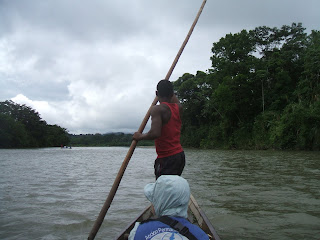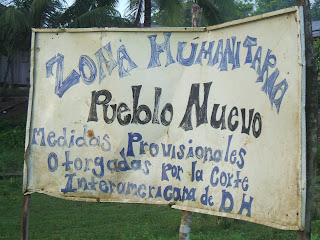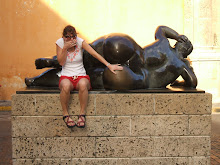A while ago I posted an entry about the context of the Witness for Peace delegation that I went on last month, but I am only now able to sit down and write about the delegation itself. There is so much to tell that I just haven't known where to start. So this piece is but a humble attempt to do justice to the people who shared harrowing stories with us and to help give you a picture of the realities in one corner of Colombia.

Over the course of four full days of travel in distant parts of the Curvaradó and Jig uamiendó river basins, our group visited five different communities. All but one were designated as "humanitarian zones," areas described well by an Inter Press Service article (see link below) as communities opposed to Colombia's ongoing war that "defend the distinction between civilians and combatants, as established by international humanitarian law." As one person in the Las Camelias humanitarian zone put it, the zone is "a way to protect our lives and our land in the midst of war." The zones all have the backing of the Inter-American Court of Human Rights.
uamiendó river basins, our group visited five different communities. All but one were designated as "humanitarian zones," areas described well by an Inter Press Service article (see link below) as communities opposed to Colombia's ongoing war that "defend the distinction between civilians and combatants, as established by international humanitarian law." As one person in the Las Camelias humanitarian zone put it, the zone is "a way to protect our lives and our land in the midst of war." The zones all have the backing of the Inter-American Court of Human Rights.
 uamiendó river basins, our group visited five different communities. All but one were designated as "humanitarian zones," areas described well by an Inter Press Service article (see link below) as communities opposed to Colombia's ongoing war that "defend the distinction between civilians and combatants, as established by international humanitarian law." As one person in the Las Camelias humanitarian zone put it, the zone is "a way to protect our lives and our land in the midst of war." The zones all have the backing of the Inter-American Court of Human Rights.
uamiendó river basins, our group visited five different communities. All but one were designated as "humanitarian zones," areas described well by an Inter Press Service article (see link below) as communities opposed to Colombia's ongoing war that "defend the distinction between civilians and combatants, as established by international humanitarian law." As one person in the Las Camelias humanitarian zone put it, the zone is "a way to protect our lives and our land in the midst of war." The zones all have the backing of the Inter-American Court of Human Rights.The humanitarian zones are remote communities. To get to Pueblo Nuevo -- the first zone we visited -- we traveled by airplane, bus, 4x4, and boat (really a dugout canoe with  a motor attached to it). The zones have no electricity or running water. Residents practice some subsistence farming and barely eke out a living. In two of the zones I saw school buildings (more like shacks, really), but it was unclear to me if or when teachers actually come through to offer classes. In Pueblo Nuevo, as I stood under the leaky school roof while a torrential tropical rainstorm raged, I was hit by the smells of wood smoke and raw sewage. It occurred to me that that combination is the smell of poverty.
a motor attached to it). The zones have no electricity or running water. Residents practice some subsistence farming and barely eke out a living. In two of the zones I saw school buildings (more like shacks, really), but it was unclear to me if or when teachers actually come through to offer classes. In Pueblo Nuevo, as I stood under the leaky school roof while a torrential tropical rainstorm raged, I was hit by the smells of wood smoke and raw sewage. It occurred to me that that combination is the smell of poverty.
 a motor attached to it). The zones have no electricity or running water. Residents practice some subsistence farming and barely eke out a living. In two of the zones I saw school buildings (more like shacks, really), but it was unclear to me if or when teachers actually come through to offer classes. In Pueblo Nuevo, as I stood under the leaky school roof while a torrential tropical rainstorm raged, I was hit by the smells of wood smoke and raw sewage. It occurred to me that that combination is the smell of poverty.
a motor attached to it). The zones have no electricity or running water. Residents practice some subsistence farming and barely eke out a living. In two of the zones I saw school buildings (more like shacks, really), but it was unclear to me if or when teachers actually come through to offer classes. In Pueblo Nuevo, as I stood under the leaky school roof while a torrential tropical rainstorm raged, I was hit by the smells of wood smoke and raw sewage. It occurred to me that that combination is the smell of poverty.The humanitarian zones were founded by peasant farmers who were forcibly displaced from their homes and their land by military and paramilitary operations in the mid- to late 1990s. They joined the ranks of Colombia's internally displaced population, which in 2009 (according to the Internal Displacement Monitoring cntre) numbered up to 4.9 million.
In Las Camelias, one woman (I'll call her Rosa) told a representative story of what displacement had entailed for her. Rosa is a rail-thin Afro-Colombian woman who smoked ragged cigarettes and hugged me like an old friend when she met me. She is the mother of eight, grandmother of 36, and great-grandmother of three. She has been accused of being a leader of the 57th Front of the guerrilla Revolutionary Armed Forces of Colombia. There is a reward on her head.
Her diplacement began in 1996, when she and some other people from her town fled into the jungle to escape armed attacks on their community. They lived there for six months. During that time, the men would sneak back to their land to get food. The group would scatter to another area whenever they heard gunshots. With help from a Spanish non-profit and an area church, Rosa and her companions eventually left the jungle for a town where they lived for a year -- all the while hearing gunshots and explosions as the paramilitaries occupied neighboring communities.
They then relocated to the town of Caño Seco where they could hear the destruction of the town from which they had just been displaced. While in Caño Seco, the community got together and decided that the elderly and people with young children should move to the town of Murindó. The rest of the group moved too, but to the town of Bartólo where they stayed for two years. This pattern continued for years. Rosa told us that, all totalled, the community endured 13 displacements before deciding to return to the land that had been theirs and establishing the humanitarian zone.

Heartrending stories like this one were repeated everywhere we went. It was hard to listen to over and over again. But it was impossible not to be intensely moved by the courage these people have shown and continue to show as they defend their right to live what in Spanish is called a "vida digna," a dignified life.
